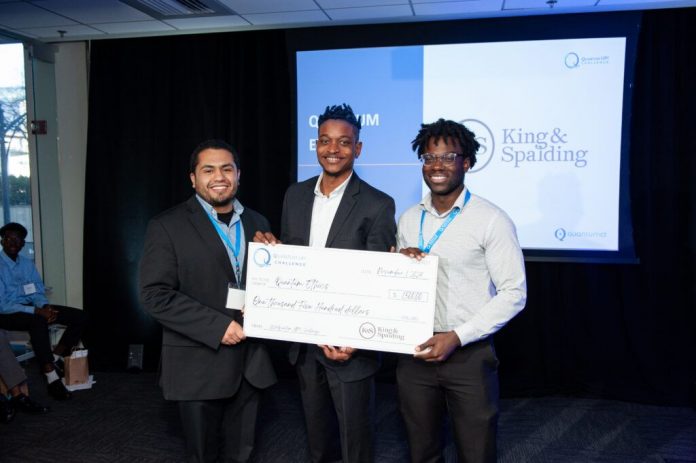Quantum technology is poised to transform industries worldwide, and Southern Connecticut State University students are leading the way, competing alongside top institutions in this exciting field.
In early November, teams from across the region gathered to showcase the transformative potential of quantum innovation during Quantum UP!, a unique “hackathon” designed for students from non-STEM fields.
Representing Team Quantum Ethics, SCSU students Crossby Dessallines and Jose Daniel Mandujano earned a $1,500 prize for their outstanding project.
Spanning several weeks, Quantum UP! takes students through a comprehensive journey, from foundational quantum education to team collaboration, real-world challenges, and final presentations.
Held at UConn’s Graduate Business Learning Center in Hartford, the event awarded $9,000 in prizes to teams that addressed challenges presented by leading companies. Southern students joined peers from UConn, Yale, and other universities in exploring the wide-ranging applications of quantum technology in fields like business, law, and healthcare.
“SCSU is proud of its prominent role in QuantumCT offering cutting use-inspired research through the CSCU Center for Nanotechnology and Werth Industry Academic Fellowship Program while also providing opportunities for engagement in important Quantum adjacent fields including business and quantum ethics,” said Dr. Christine Broadbridge, executive director for the Division of Research and Innovation and the Innovation Hub at Southern Connecticut State University.
Below is an interview with Dessallines and Mandujano.
Emerging technologies like quantum computing often feel abstract to those outside the field. How do you think quantum computing will tangibly impact industries like finance and insurance in the next two decades?
CD: I think quantum like all technological leaps, will just make certain facets of any industry more efficient. It’ll change how said industry is set up and will simultaneously create and eliminate jobs, but ultimately it’ll make things more efficient. Why make a junior analyst do the number crunching when a quantum computer can do it in not even a fraction of the time.
JM: Quantum computing has the potential to revolutionize industries like finance and insurance. Imagine being able to analyze massive datasets in seconds, rather than days or weeks. This could lead to more accurate risk assessments, improved fraud detection, and innovative financial products.
What challenges did you face during the project, particularly in making quantum concepts accessible and actionable for industry applications? How did you overcome them?
CD: The obvious challenge was just getting information. There’s many readings, articles, and studies on quantum and on trade secrets. However, when they blend together you get something very exotic, new, and something many people have not considered. And many more that haven’t even thought of it as a possibility. We overcame it by doing our due diligence and gathering as much information on both topics separately. Then doing countless thought experiments, rooted in the capabilities quantum has today and what it will possibly have in the near future. We also wanted to make sure we were as realistic and down-to-earth as possible.
JM: One of the biggest challenges we faced was understanding the complex concepts of quantum mechanics. To overcome this, we broke down the information into smaller, more manageable chunks and used analogies to explain complex ideas. We researched experts who helped us visualize these abstract concepts.
The competition brought together over 100 students from diverse institutions. What was it like working alongside such a wide array of talented peers, and did any ideas or collaborations particularly inspire you?
CD: It was definitely very inspiring and intimidating simultaneously. Like being surrounded by like-minded people with the same interest and passion within a field, while simultaneously having imposter syndrome. the wide diversity of students gave my partner and me intense motivation to crush it in every way possible.
JM: Working with other talented students from diverse backgrounds was incredibly inspiring. It was exciting to see how different perspectives could be combined to solve complex problems. While we focused on our own project, we were also amazed by the innovative ideas of our peers.
What role do you see students, and yourselves, playing in shaping the quantum technology landscape, both in Connecticut and beyond?
CD: I see my peers and I playing the roles of leaders, engineers, members of ethics boards, and policy-makers, both within Connecticut and outside its borders. This technology isn’t isolated to just one place in the country or even the world. Quantum has so much potential and needs bright minds and leadership to ensure its capabilities are fully utilized in a safe and ethical way. The over 100 students present at the competition gave me nothing but hope and excitement for the future of quantum.
JM: As students, we believe we have a unique opportunity to shape the future of quantum technology. By gaining practical experience, conducting research, and collaborating with others, we can contribute to the development of this groundbreaking field.
For students and young professionals interested in quantum computing, what advice would you give them for breaking into the field and contributing to its growth?
CD: I would tell them to not be intimidated, be eager to learn, and be open to change. The good news is this technology is still relatively new so there really isn’t a lot of information to digest to really grasp it. So start learn as soon as you can. I would say bring it into your everyday life, talk about it more to friends and family, keep up to date with the latest research, volunteer TO do the research or convince bright minds to contribute to the intellectual load of new knowledge. All of these actionable steps will greatly contribute to the enhancement of quantum computing.
JM: My advice for aspiring quantum professionals is to be curious, persistent, and collaborative. A strong foundation in quantum mechanics and computer science is crucial to understanding the intricacies of quantum computing. Seek out opportunities to gain practical experience through internships, research projects, or online research.


